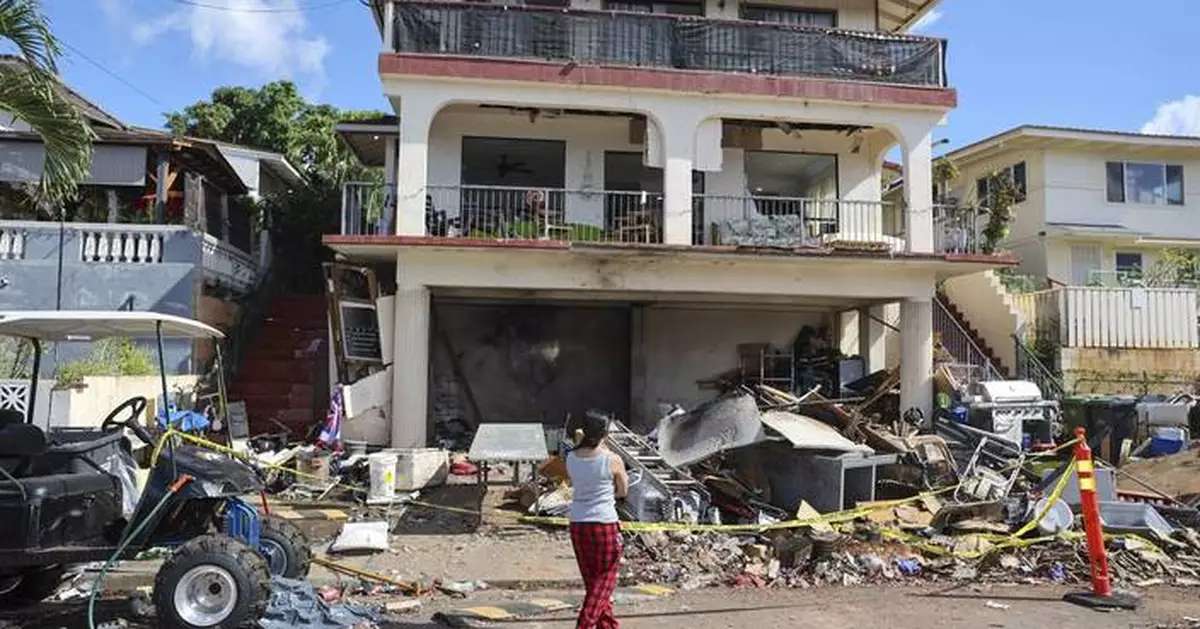HONOLULU (AP) — In recent years, occasions large and small — parties, Super Bowls, mixed martial arts fights, even Thanksgiving — have provided a reason for residents across Hawaii to set off illegal fireworks.
The increasingly sophisticated displays, loved by some and loathed by others, are so prevalent that some people consider them part of the state's culture. They have rattled neighborhoods of tightly packed houses, started fires, terrorized pets and knocked a light fixture off the ceiling of an Associated Press reporter’s home, where it narrowly missed a child and shattered on the floor.
Each New Year's Day, Honolulu officials publish a list of fireworks casualties from the night before, typically a litany of burns, shrapnel wounds or amputations. Sometimes there are deaths.
But none of the damage has matched Tuesday night's tragedy, when a lit bundle of mortar-style aerials tipped over and shot into crates of unlit fireworks, causing a rapid-fire series of blasts that killed three women and injured more than 20 people, including children. Another person was killed in an unrelated fireworks explosion on Oahu.
Authorities and residents alike are now wondering whether the toll will dissuade people from putting on such shows in the future, or whether it will prompt more effective efforts by police to crack down.
“This incident is a painful reminder of the danger posed by illegal fireworks,” Honolulu Mayor Rick Blangiardi told a news conference. “They put lives at risk, they drain our first responders and they disrupt our neighborhoods.”
On Friday, the Honolulu medical examiner’s department identified two of the women as Nelie Ibarra, 58, and Jennifer Van, 23. The cause and manner of death for both were listed as pending. The identity of the third was not yet confirmed, the department said in a news release.
The military, in response to a request from Hawaii Gov. Josh Green, plans to fly six burn patients to Arizona for treatment as early as Saturday. Hawaii has only one specialized burn unit and online fundraisers for some victims said they would need to go to Arizona because their home state's hospitals don’t have the space to care for them.
Efforts to crack down on contraband fireworks have had limited effect. In 2023, lawmakers created an illegal fireworks task force. Based on the ease with which it seized fireworks, including three shipping containers in its first few months in operation, the state Department of Law Enforcement concluded illegal fireworks are likely smuggled into Hawaii on a daily basis.
The task force has seized 227,000 pounds (about 103,000 kilograms) of fireworks in all, according to Green.
And yet, the Honolulu Fire Department reported Thursday that there were 30 fireworks-related blazes between Tuesday and Wednesday, a 30% increase from last New Year's celebrations.
Rep. Gregg Takayama, who sponsored legislation passed last year to tighten fireworks controls, said he remembers setting them off when he was younger and agrees it’s a tradition for many. But the ones he played with, including Roman candles, pale in comparison to those on the black market today.
“The kind of aerial fireworks that are being used now are really explosive bombs,” he said. “And so the danger is magnified.”
Charmaine Doran, the vice-chair of the neighborhood board in Pearl City, northwest of Honolulu, called the notion that fireworks are part of Hawaii culture a misconception: “They have been outlawed for all of my life ... and I’m pretty old.”
In her neighborhood, the fireworks ramp up after Halloween, exploding in the middle of the night until New Year’s. Doran said she can tell if there is a big mixed martial arts fight on TV because the booms begin earlier in the day.
Enforcement is complicated because people are reluctant to report their neighbors on a small island where “we’re related to everybody, everybody knows everybody,” Doran said.
People fear retribution, she added: “If I dial 911, they’re going to egg my house.”
That was the theme of some testimony to the Legislature last January. Beverly Takushi, a Pearl City resident, described once being threated by a neighbor when she told his brother to stop launching illegal fireworks in a show that lasted from 5:30 p.m. on New Year’s Eve until after midnight.
“It was the first time I was threatened not only by the danger of the aerial fireworks to my family and property, but also for my safety from this neighbor who accused me of not respecting his culture,” Takushi said. “He has since apologized, but this is the reason why no one wants to get involved and report their neighbors setting off bombs and aerials.”
Many historians believe fireworks were invented in China more than 2,000 years ago and their use came to signify joy and prosperity, as well as warding off evil. In Hawaii they are celebrated not just by residents of Chinese descent but all across the state's diverse communities.
Takushi echoed Takayama's point about the big difference between today's large, professional-grade fireworks and the smaller ones of yesteryear.
“A string of firecrackers at midnight to ward off bad spirits is cultural, not loud explosives that sound like you are in the middle of a war," Takushi said.
Richard Oshiro, secretary of the neighborhood board for Waipahu, known as one of Oahu’s hotspots for aerial displays, said he hopes this week's deaths will spur a change of mentality about playing with explosives.
He said he tries to report them whenever he can, even though he knows there is not much police can do if “they can’t catch people in the act.”
Possession of over 50 pounds (about 23 kilograms) of aerial or other illegal fireworks in Hawaii is a felony punishable by up to five years in prison and a $10,000 fine. Takayama noted the law now allows photographs and videos of fireworks to be submitted as evidence in court, but said prosecutions still face hurdles.
“We already have laws on the books. We need to find better ways to enforce them,” he said. "I mean we constantly hear about people who report on their neighbors using illegal aerials, but nothing is done about it.”
The best way to control fireworks is to stop them at Hawaii’s ports, Takayama said. Law enforcement has intelligence about which shipments contain illegal fireworks and U.S. authorities have the power to open suspicious cargo. The task force has made seizures but needs to do more, he said.
“We need to find ways to restrict the amount of fireworks that are coming in, because once they arrive and once they’re in the community, it’s very difficult to track them down,” Takayama said.
Authorities hope some will turn in their fireworks under an amnesty program. Green said in a video posted on social media that law enforcement will be at Aloha Stadium outside Honolulu to accept illegal fireworks on Jan. 11. No one who drops off fireworks will be prosecuted, he said.
Johnson reported from Seattle.
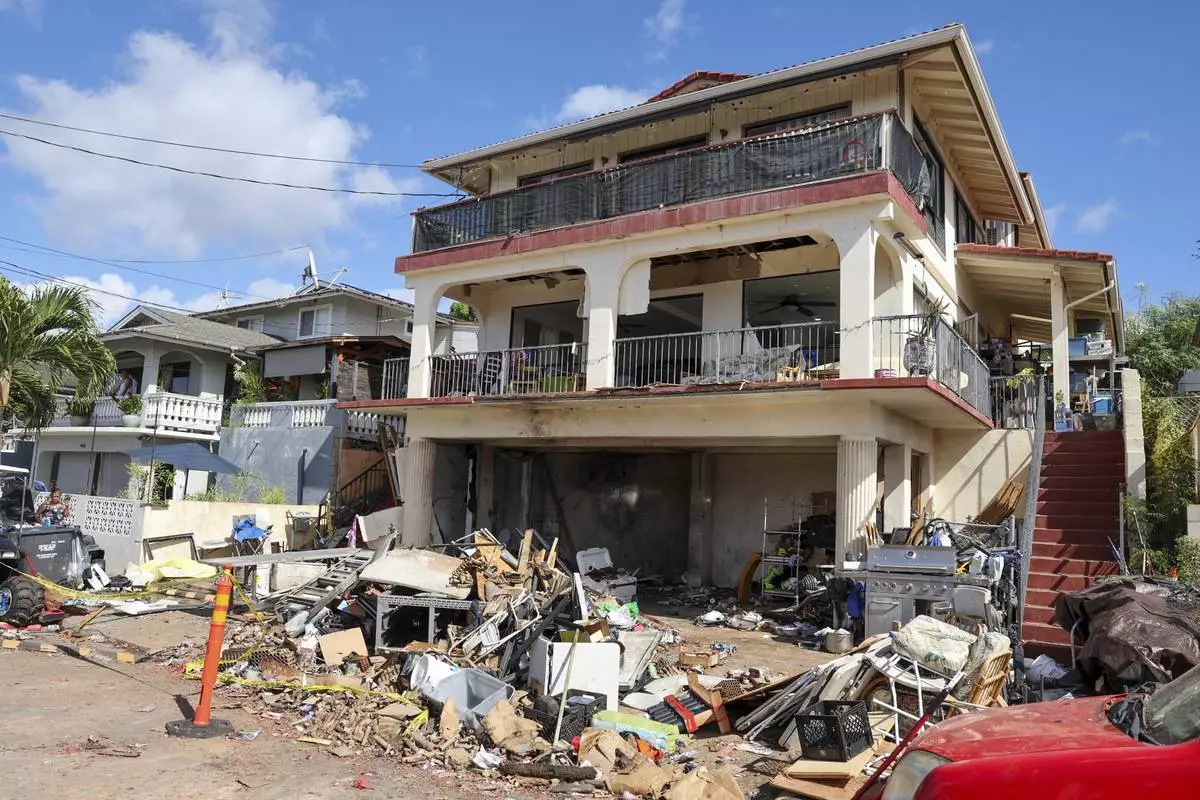
A view of the home where a New Year's Eve fireworks explosion killed and injured people, Wednesday, Jan. 1, 2025, in Honolulu. (AP Photo/Marco Garcia)
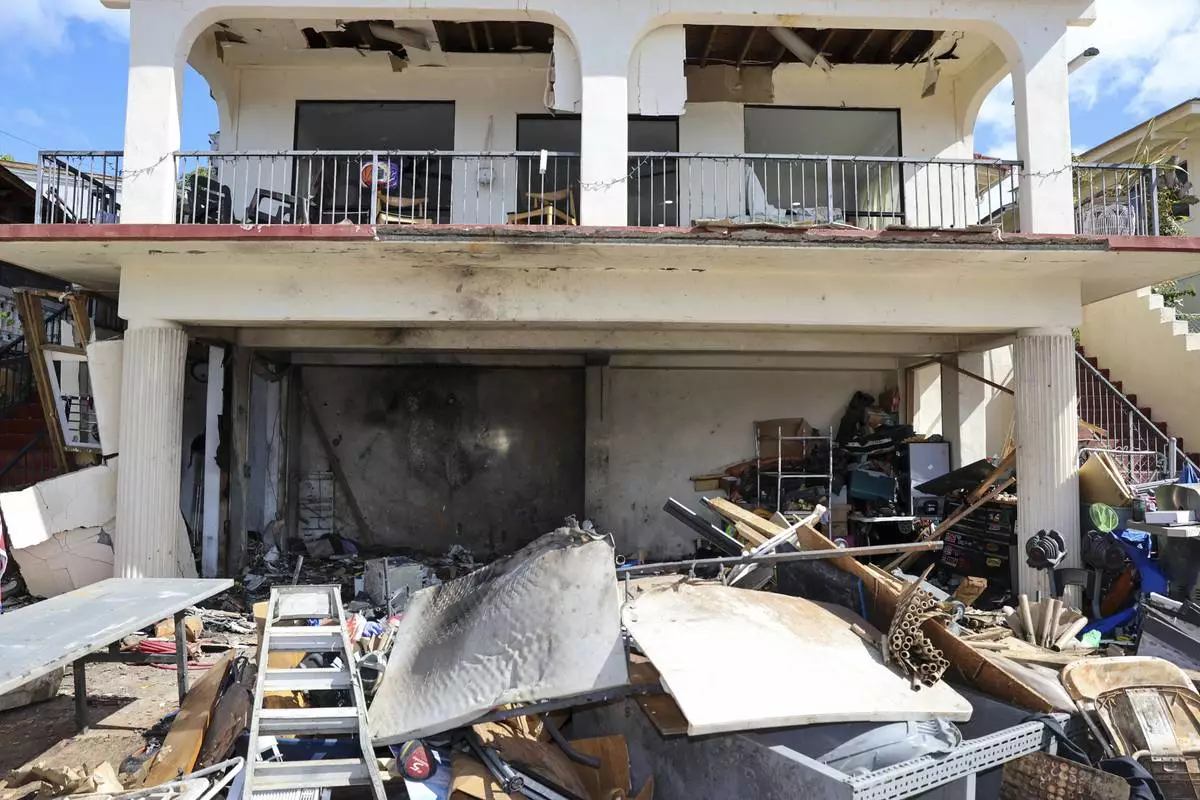
A view of the home where a New Year's Eve fireworks explosion killed and injured people, Wednesday, Jan. 1, 2025, in Honolulu. (AP Photo/Marco Garcia)
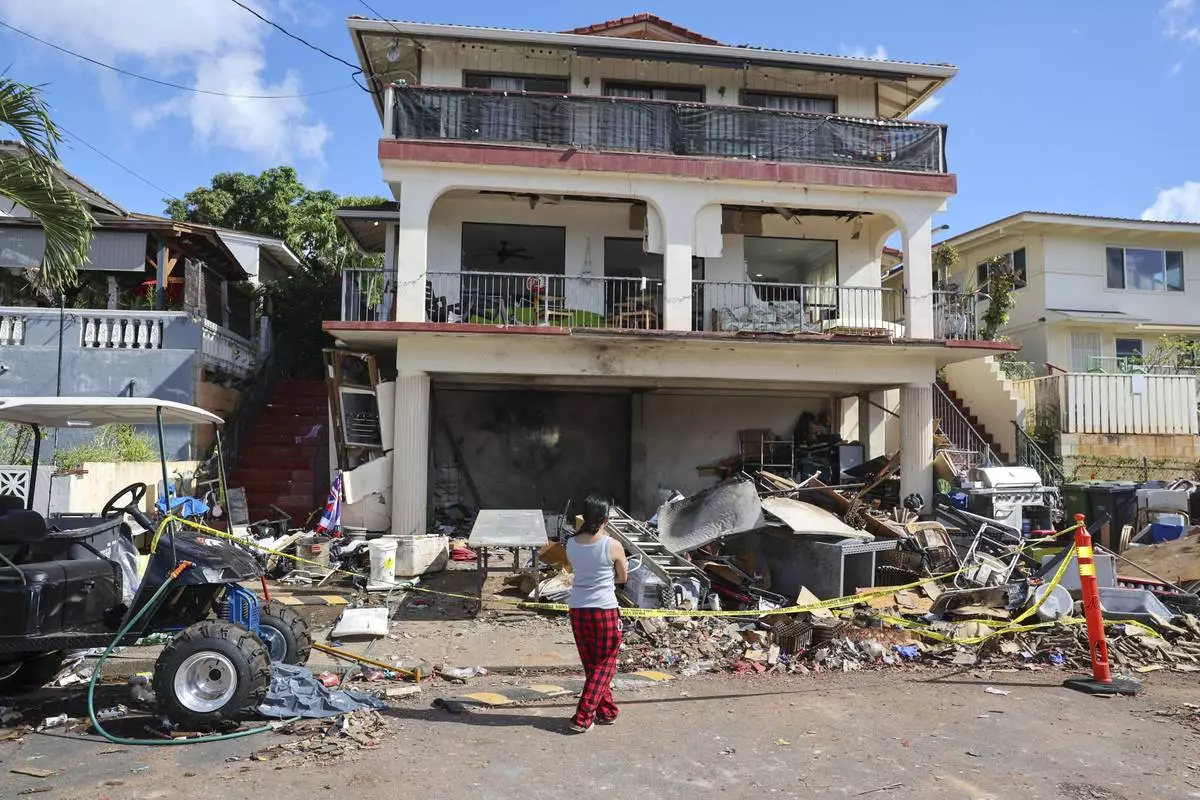
A woman stands in front of the home where a New Year's Eve fireworks explosion killed and injured people, Wednesday, Jan. 1, 2025, in Honolulu. (AP Photo/Marco Garcia)
SEOUL, South Korea (AP) — Hundreds of South Koreans, bundled up against freezing temperatures and snow, rallied overnight into Sunday near the residence of impeached President Yoon Suk Yeol, calling for his ouster and arrest, as authorities prepared to renew their efforts to detain him over his short-lived martial law decree.
Dozens of anti-corruption agency investigators and police attempted to execute a detainment warrant against Yoon on Friday but retreated from his residence in Seoul after a tense standoff with the presidential security service that lasted more than five hours.
The one-week warrant for his detention is valid through Monday. There were no immediate indications that anti-corruption authorities were ready to send investigators back to the residence as of Sunday afternoon. Staff from the presidential security service were seen installing barbed wire near the gate and along the hills leading up to Yoon’s residence over the weekend, possibly in preparation for another detention attempt.
Last Tuesday, a Seoul court issued a warrant to detain Yoon and a separate warrant to search his residence after the embattled president defied authorities by refusing to appear for questioning and obstructing searches of his office. But enforcing them is complicated as long as Yoon remains in his official residence.
Investigators from the country’s anti-corruption agency are weighing charges of rebellion after the conservative president, apparently frustrated that his policies were blocked by a legislature dominated by the liberal opposition, declared martial law on Dec. 3 and dispatched troops to surround the National Assembly.
The Assembly overturned the declaration within hours in a unanimous vote and impeached Yoon on Dec. 14, accusing him of rebellion, while South Korean anti-corruption authorities and public prosecutors opened separate investigations into the events.
If the anti-corruption agency manages to detain Yoon, it will likely ask a court for permission to make a formal arrest. Otherwise, Yoon will be released after 48 hours.
The Corruption Investigation Office for High-Ranking Officials, which is leading a joint investigation with police and military investigators, says detaining Yoon would be “virtually impossible” as long as he is protected by the presidential security service. The agency has urged the country’s acting leader, Deputy Prime Minister Choi Sang-mok, to instruct the service to comply with their execution of the detainment warrant, but Choi has yet to publicly comment on the issue.
In a video statement, Park Jong-joon, chief of the presidential security service, hit back against criticism that his organization has become Yoon's private army, saying it has legal obligations to protect the incumbent president. Park said he instructed his members not to use violence during their standoff with investigators and called for the anti-corruption agency and police to change their approach.
Park and the deputy chief of the presidential security service defied summonses on Saturday from police, who planned to question them over the suspected obstruction of official duty following Friday’s events.
Yoon’s legal team said it will file complaints against the anti-corruption agency’s chief prosecutor, Oh Dong-woon, and approximately 150 investigators and police officers involved in Friday’s detention attempt, which they claim was unlawful. The team said it will also file complaints with public prosecutors against the country’s acting defense minister and police chief for ignoring the presidential security service’s request to provide additional forces to block the detention attempt.
Yoon’s lawyers had submitted an objection to the warrants against the president on Thursday, but the Seoul Western District Court dismissed the challenge on Sunday.
Park Chan-dae, floor leader of the main opposition Democratic Party, called for the anti-corruption agency to move quickly to detain Yoon, saying it was deeply disappointing to see the agency “hesitating and letting time slip away.”
Hundreds of anti-Yoon protesters rallied for hours near the gates of the presidential residence from Saturday evening to Sunday, voicing frustration over the failed detention attempt and demanding stronger efforts to bring Yoon into custody. Separated by police barricades and buses, pro-Yoon protesters were gathering in nearby streets, denouncing his impeachment and vowing to block any efforts to detain him.
“With barely a day left before the execution deadline for Yoon Seok Yeol’s detainment warrant, the presidential security service continues to hide a criminal and the Corruption Investigation Office for High-Ranking Officials cannot be more relaxed,” Kim Eun-jeong, an activist, said on a stage during the anti-Yoon rally.
“Angry citizens have already spent two freezing nights demanding his immediate detainment. Are their voices not being heard?”
Yoon’s lawyers have challenged the detention and search warrants against the president, saying they cannot be enforced at his residence due to a law that protects locations potentially linked to military secrets from search without the consent of the person in charge — which would be Yoon. They also argue the anti-corruption office lacks the legal authority to investigate rebellion charges and that police officers don’t have the legal authority to assist in detaining Yoon.
While the presidential security act mandates protection for Yoon, it does not authorize the presidential security service to block court-ordered detainments. The service’s attempts to block the execution of the warrant may amount to an obstruction of official duty, according to Park Sung-bae, an attorney specializing in criminal law. While the president mostly has immunity from prosecution while in office, the protection does not extend to allegations of rebellion or treason.
The agency said its outnumbered investigators had several scuffles with presidential security forces that threatened their safety and expressed “serious regret” that Yoon was not complying with the legal process.
After getting around a military unit guarding the residence’s grounds, the agency’s investigators and police were able to approach within 200 meters (about 218 yards) of Yoon’s residential building but were stopped by a barricade comprising around 10 vehicles and approximately 200 members of the presidential security forces and troops. The agency said it wasn’t able to visually confirm whether Yoon was inside the residence.
The Defense Ministry says the troops at Yoon’s official residence are under the control of the presidential security service. Kim Seon-ho, the acting defense minister, conveyed his concern to the presidential security service, saying that deploying military personnel to block the execution of the detention warrant would be “inappropriate” and requesting that the troops aren’t placed in a position where they might confront police, according to the ministry.
Yoon’s defense minister, police chief and several top military commanders have already been arrested over their roles in the period of martial law.
Yoon’s presidential powers have been suspended since the National Assembly voted to impeach him on Dec. 14. Yoon’s fate now lies with the Constitutional Court, which has begun deliberations on whether to uphold the impeachment and formally remove Yoon from office or reinstate him.
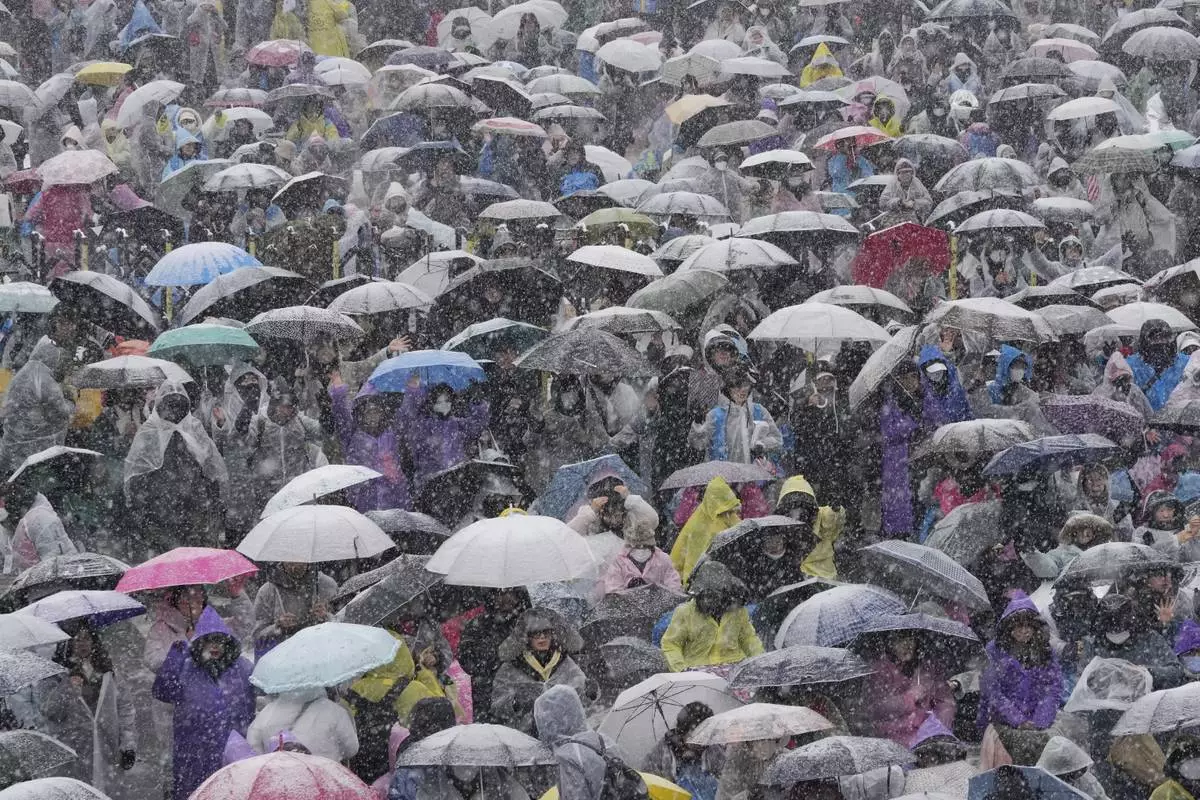
Supporters of impeached South Korean President Yoon Suk Yeol attend a Sunday service as they gather to oppose his impeachment near the presidential residence in Seoul, South Korea, Sunday, Jan. 5, 2025. (AP Photo/Ahn Young-joon)
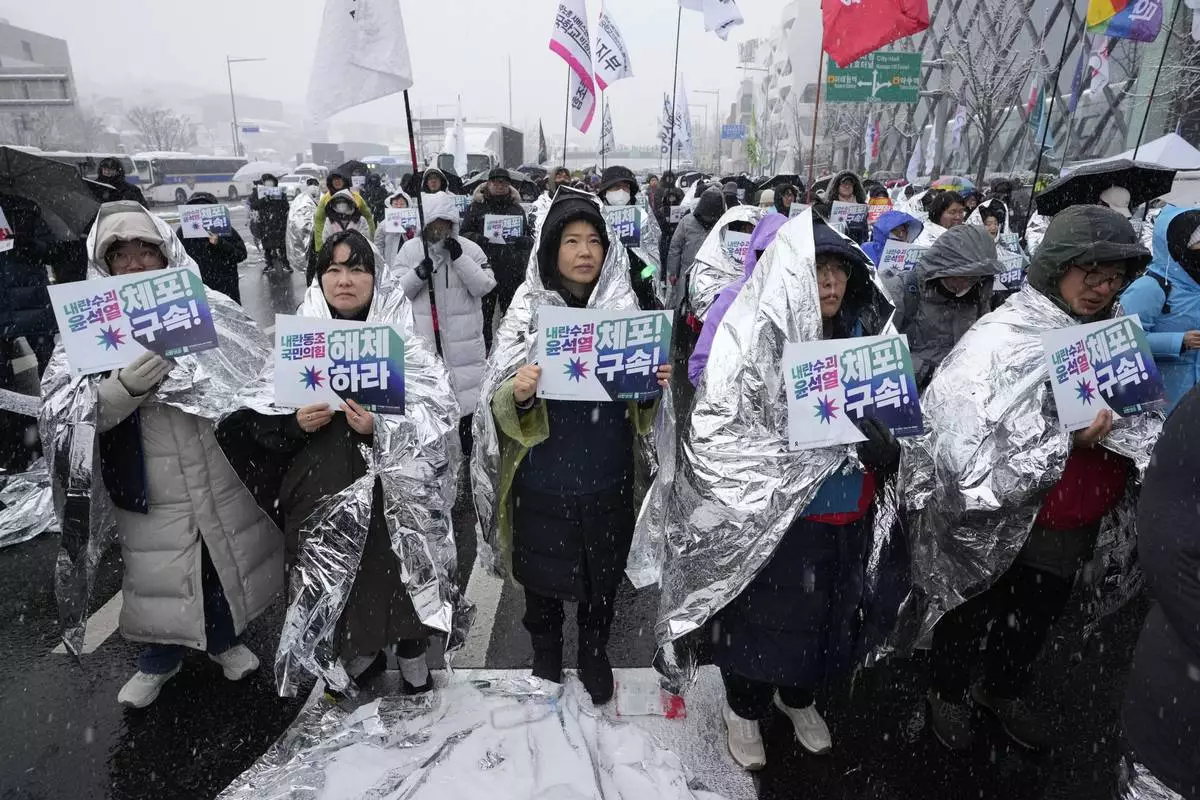
Protesters attend a rally demanding the arrest of impeached South Korean President Yoon Suk Yeol near the presidential residence in Seoul, South Korea, Sunday, Jan. 5, 2025. Banners read "Disband the ruling People Power Party," second left, and "Arrest Yoon Suk Yeol." (AP Photo/Ahn Young-joon)
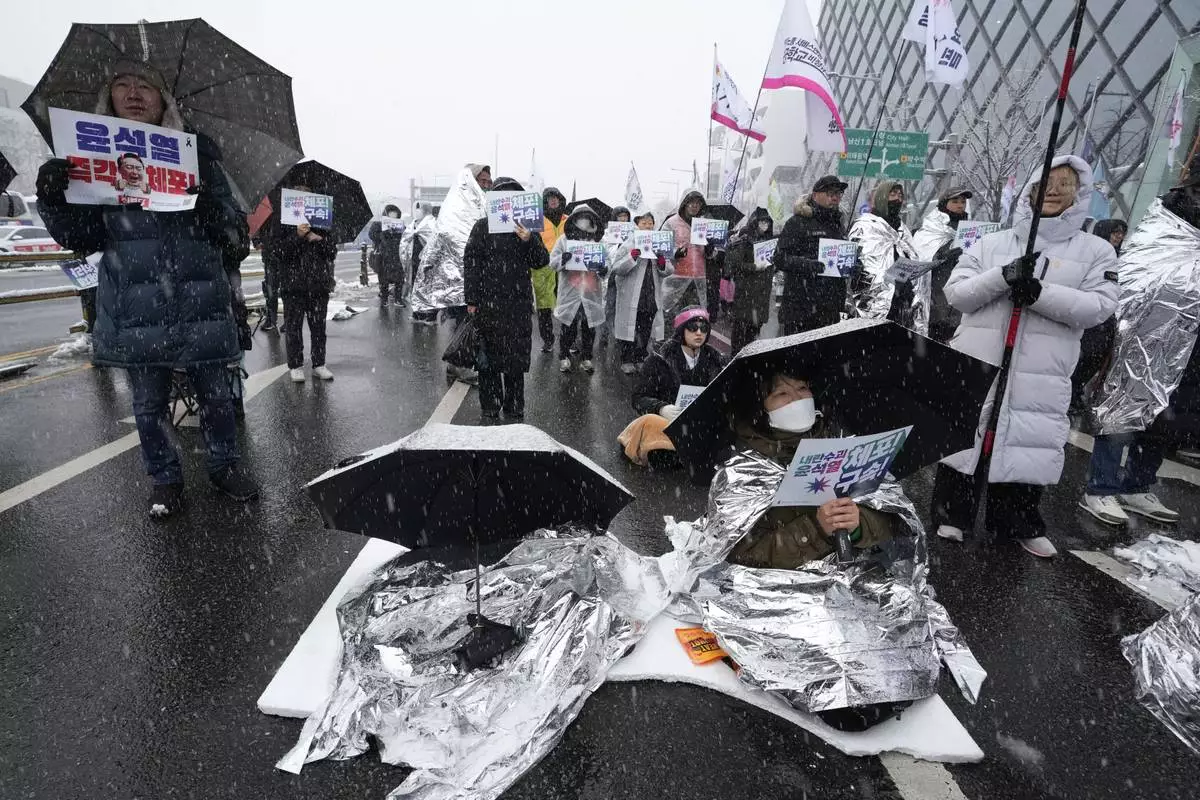
Protesters attend a rally demanding the arrest of impeached South Korean President Yoon Suk Yeol near the presidential residence in Seoul, South Korea, Sunday, Jan. 5, 2025. (AP Photo/Ahn Young-joon)
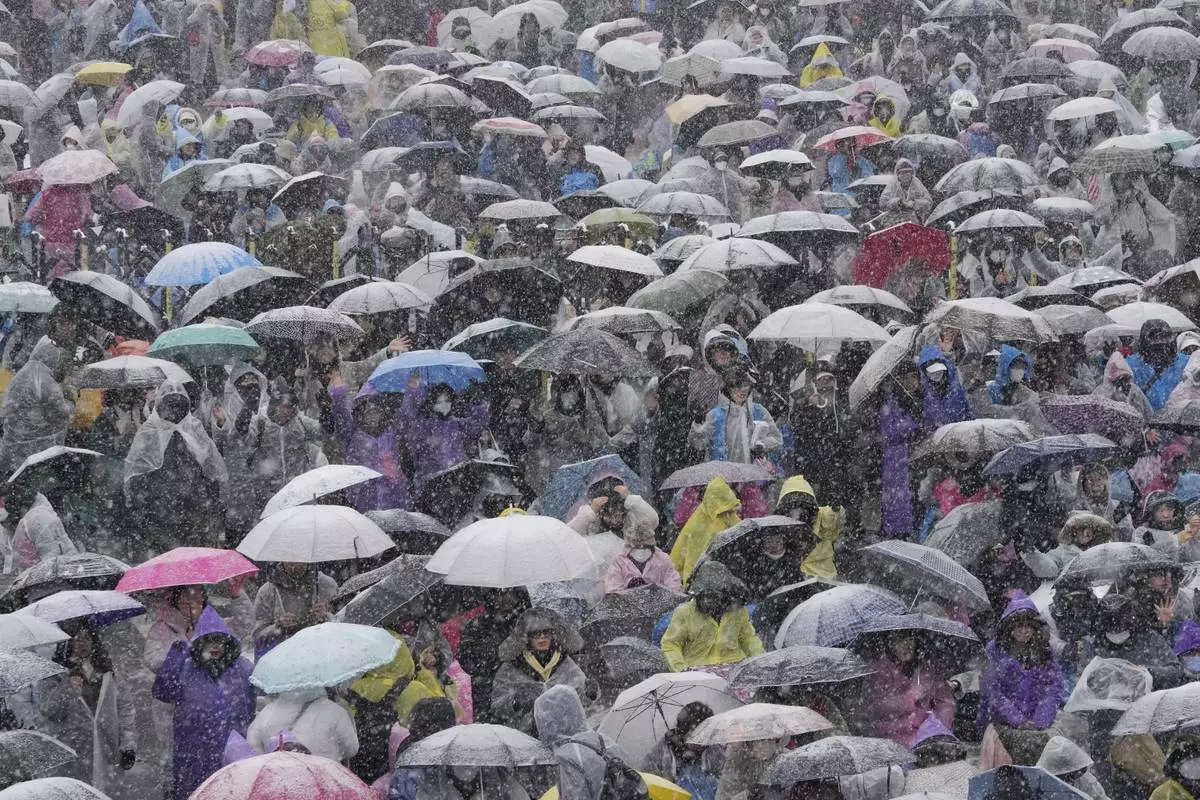
Supporters of impeached South Korean President Yoon Suk Yeol attend a Sunday service as they gather to oppose his impeachment near the presidential residence in Seoul, South Korea, Sunday, Jan. 5, 2025. (AP Photo/Ahn Young-joon)
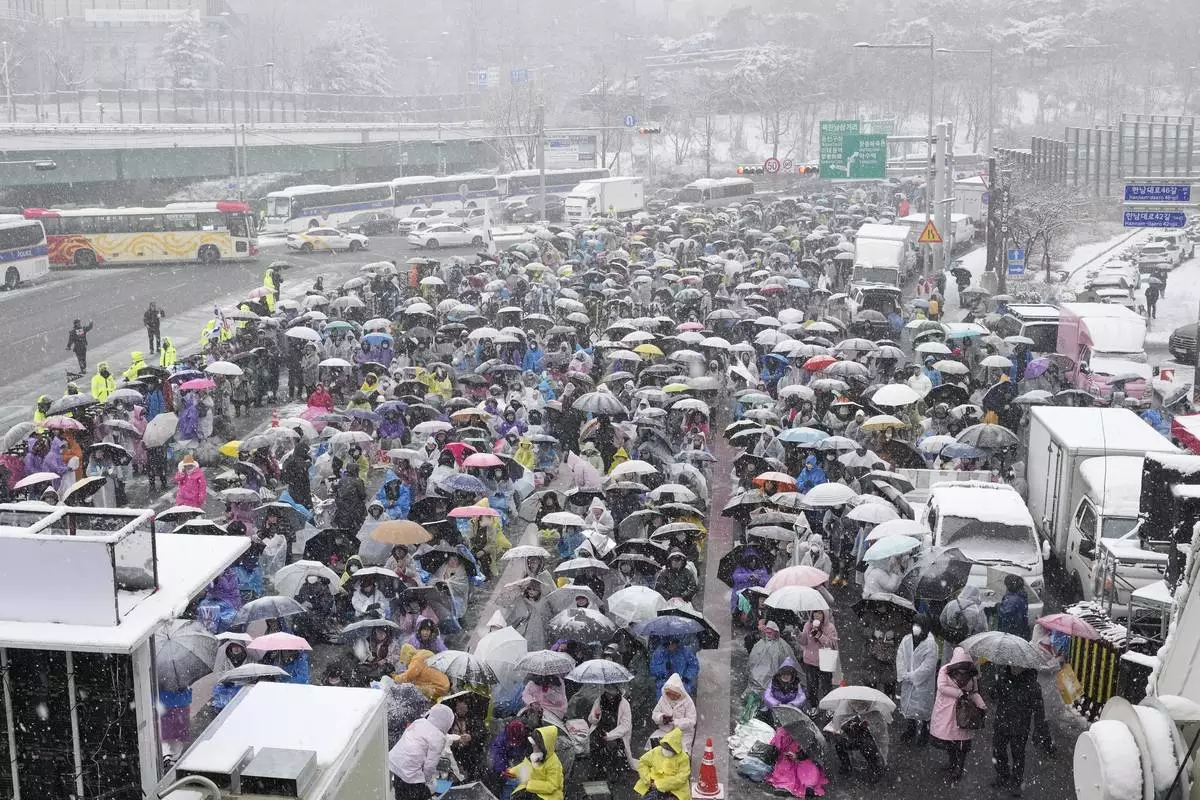
Supporters of impeached South Korean President Yoon Suk Yeol attend a Sunday service as they gather to oppose his impeachment near the presidential residence in Seoul, South Korea, Sunday, Jan. 5, 2025. (AP Photo/Ahn Young-joon)
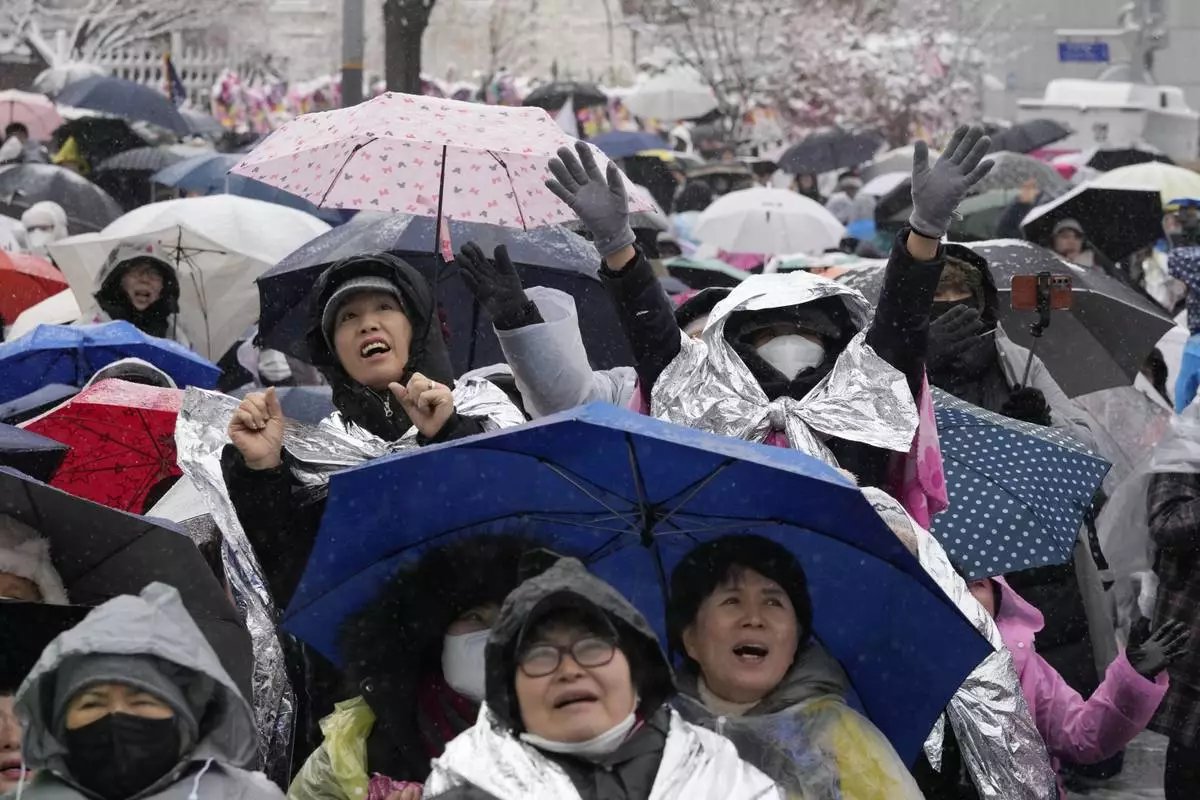
Supporters of impeached South Korean President Yoon Suk Yeol attend a Sunday service as they gather to oppose his impeachment near the presidential residence in Seoul, South Korea, Sunday, Jan. 5, 2025. (AP Photo/Ahn Young-joon)
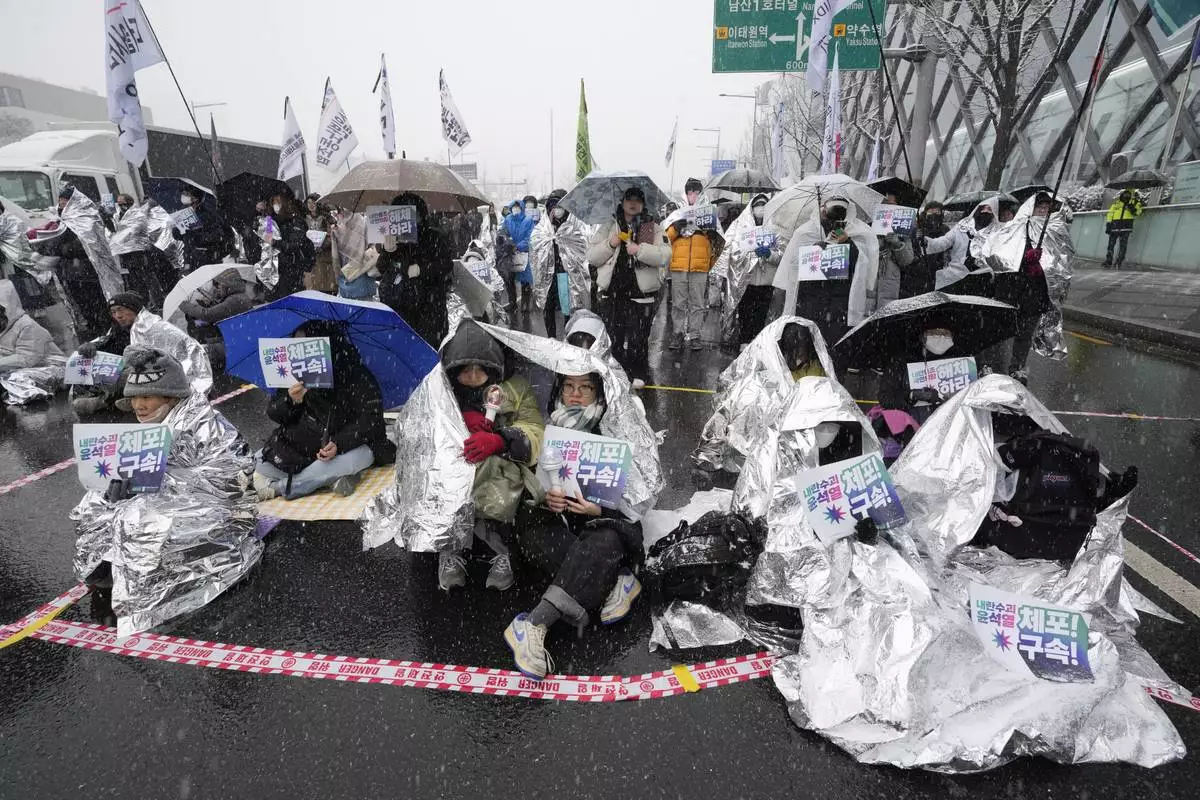
Protesters attend a rally demanding the arrest of impeached South Korean President Yoon Suk Yeol near the presidential residence in Seoul, South Korea, Sunday, Jan. 5, 2025. (AP Photo/Ahn Young-joon)
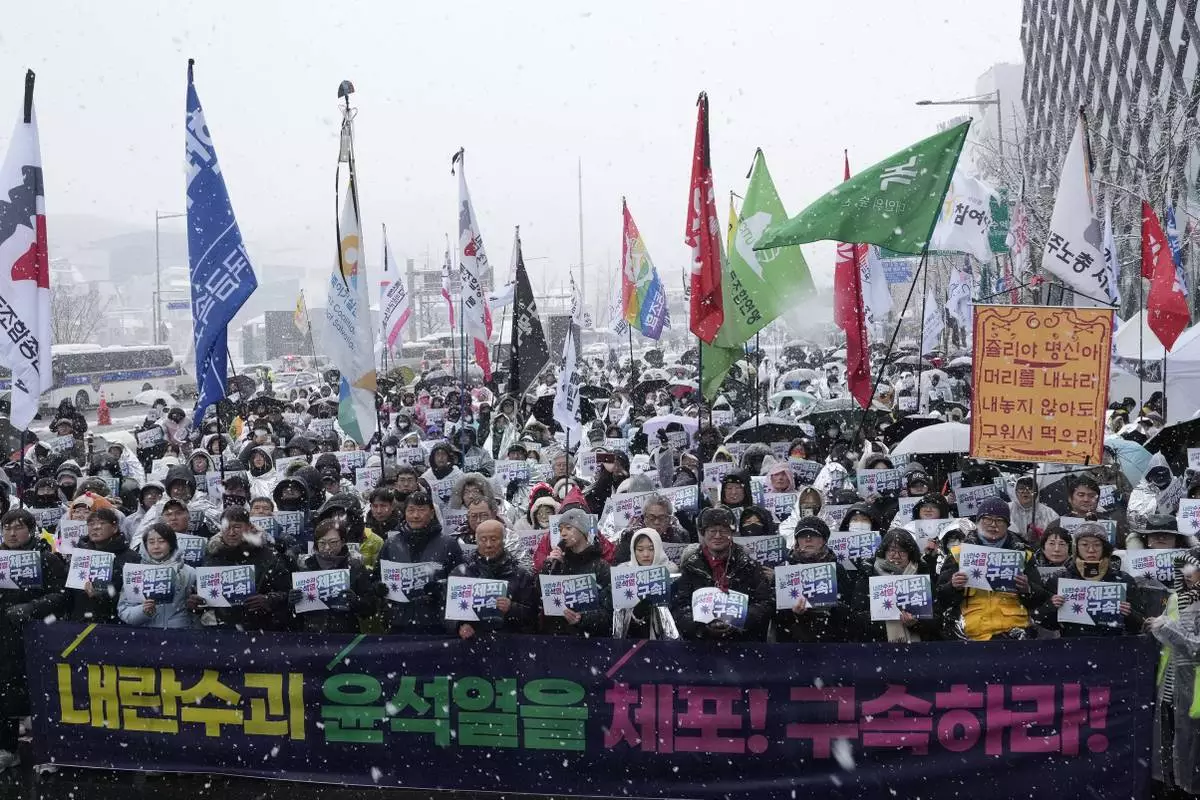
Protesters stage a rally demanding the arrest of impeached South Korean President Yoon Suk Yeol near the presidential residence in Seoul, South Korea, Sunday, Jan. 5, 2025. The letters read "Arrest Yoon Suk Yeol." (AP Photo/Ahn Young-joon)
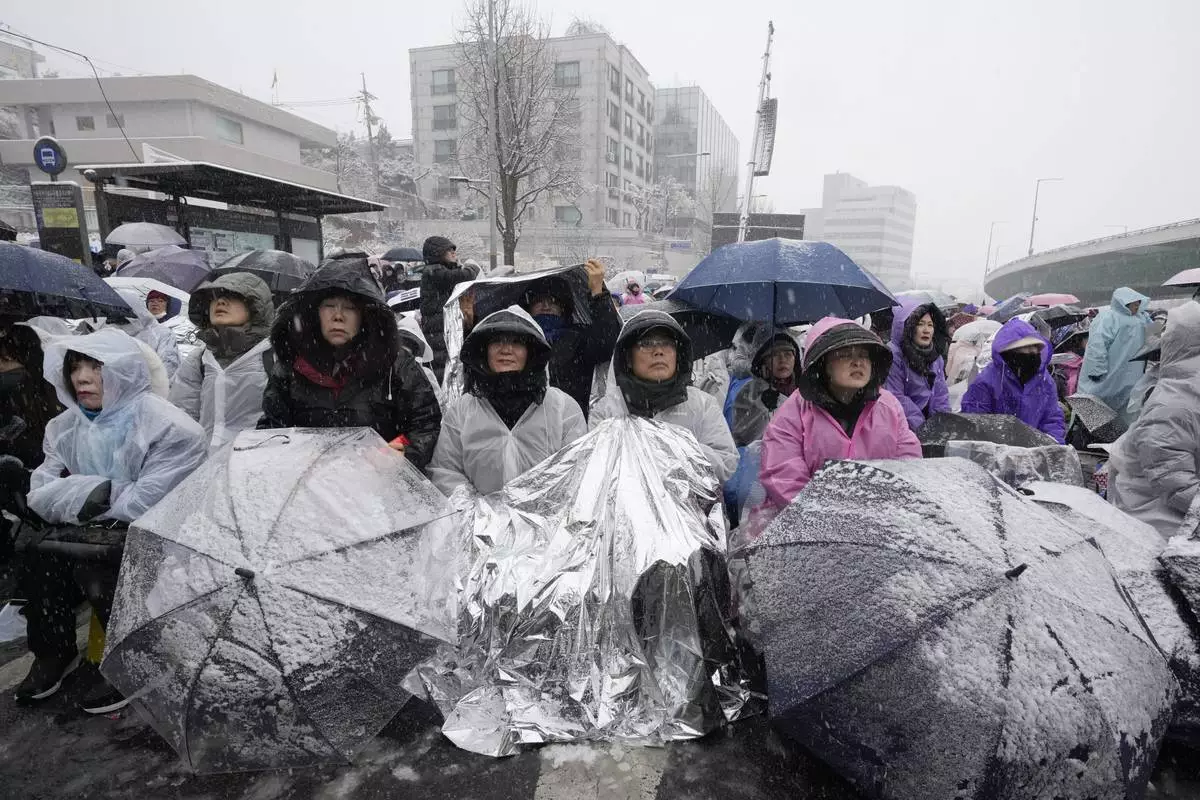
Supporters of impeached South Korean President Yoon Suk Yeol attend a Sunday service as they gather to oppose his impeachment near the presidential residence in Seoul, South Korea, Sunday, Jan. 5, 2025. (AP Photo/Ahn Young-joon)





